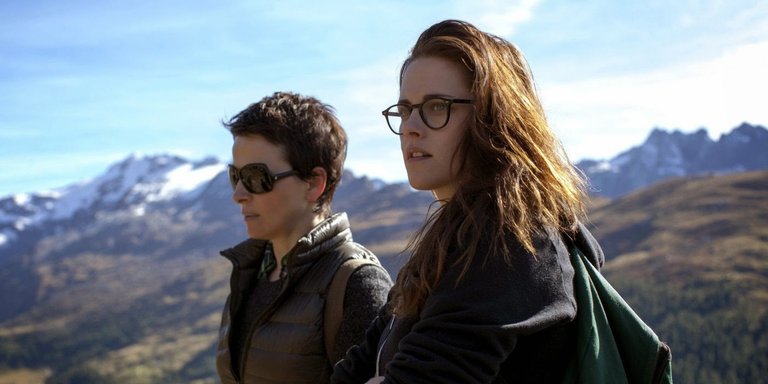
I don't remember when or where I first heard or read the name Oliver Assayas. I have a slight impression that someone must have mentioned him in an interview for Letterboxd or something, but I put it on my watch list because I thought I didn't know anything about his filmography and it turns out that he's the director of Paris je t'aime, Carlos and Wasp Network (these two starring Edgar Ramírez), of which I had only seen the last one. And once again, thanks to MUBI, I was able to see something else from a director who was quite unknown to me.
No recuerdo cuándo ni dónde fue la primera vez que escuché o leí el nombre de Oliver Assayas. Tengo la leve impresión de que alguien debió mencionarlo en una entrevista para Letterboxd o algo así, pero lo puse en mi lista de pendientes porque creí que no conocía nada de su filmografía y resulta que es el director de Paris je t'aime, Carlos y Wasp Network (estas dos protagonizadas por Edgar Ramírez), de las cuales sólo había visto esta última. Y una vez más, gracias a MUBI, pude ver algo más de un director bastante desconocido para mí.
Sils Maria, known in English as Clouds of Sils Maria and in Spanish as Viaje a Sils Maria, is a psychological drama set in the behind-the-scenes world of the tables and the big screen. Maria Enders (a wonderful Juliette Binoche) is a renowned film actress who is at the peak of her professional career and who rose to fame 20 years ago when, even though she was unknown, an important director allowed her to play the role of Sigrid, a young woman who fascinates an older woman, Helena, driving her to suicide. Now, in her early forties, Maria travels to Switzerland to pay tribute to that director in a gala that completely changes the tone due to his sudden death. Shortly after, Maria is contacted by the best theater director of the moment who offers her to participate in a new adaptation of the play that catapulted her to fame. The challenge now is that, due to her age, she can no longer play Sigrid: she must play Helena. On paper, it seems like a simple task because most people think "it's just another piece of paper, it's their job", but there are several factors that revolve around her current life that make her doubt. First, Maria is very fond of the character of Sigrid and still identifies with her; There are also the memories associated with the actress who played Helena in the original work and her tragic fate; and to this is added the death of the director (and her friend), all in the middle of Maria's divorce proceedings. Let's just say it's an emotionally complicated moment for Enders.
Sils Maria, conocida en inglés como Clouds of Sils Maria y en español como Viaje a Sils Maria, es un drama psicológico ambientado en el mundo tras bastidores de las tablas y la gran pantalla. Maria Enders (una maravillosa Juliette Binoche), es una reconocida actriz de cine que se encuentra en la cima de su carrera profesional y que saltó a la fama 20 años atrás cuando, aún siendo una desconocida, un importante director la permitió interpretar el papel de Sigrid, una joven que fascina a una mujer mayor, Helena, llevándola al suicidio. Ahora, con poco más de cuarenta años, Maria viaja a Suiza para rendir homenaje a ese director en una gala que cambia totalmente el tono debido a la repentina muerte del mismo. Poco después Maria es contactada por el mejor director teatral del momento quien le ofrece participar en una nueva adaptación de la obra que la catapultó a la fama. El desafío ahora es que, debido a su edad, ya no puede encarnar a Sigrid: debe interpretar a Helena. Sobre el papel, parece una tarea sencilla porque la mayoría piensa "es sólo un papel más, es su trabajo", pero hay varios factores que giran alrededor de su vida actual y que la hacen dudar. Primero, Maria le tiene mucho cariño al personaje de Sigrid y aún se identifica con ella; también están los recuerdos asociados a la actriz que interpertó a Helena en la obra original y su trágico destino; y a ello se suma la muerte del director (y amigo suyo), todo en medio de los trámites del divorcio de Maria. Digamos que es un momento emocionalmente complicado para Enders.
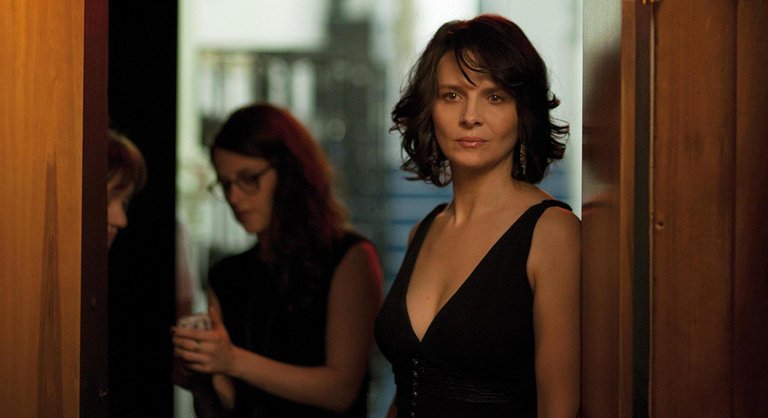
However, Maria is not alone. Her assistant Valentine (Kristen Stewart) is always at her side, coordinating interviews, helping her rehearse her lines, encouraging her, giving her advice and often commenting on her own vision of reality that, although Maria doesn't share it, she does listen to it. In the midst of the professional and personal dilemma that Maria faces, Valentine becomes a kind of grounding cable, an anchor to her reality.
Sin embargo, Maria no está sola. Su asistente Valentine (Kristen Stewart) está siempre a su lado, coordinando entrevistas, ayudándola a ensayar sus líneas, animándola, dándole consejos y muchas veces comentando su propia visión de la realidad que, aunque Maria no la comparte, sí la escucha. En medio del dilema profesional y personal al que se enfrenta Maria, Valentine viene a ser una especie de cable a tierra, de ancla a su realidad.
One of the greatest attractions of the story is that game of mirrors that develops on different levels thanks to the momentary confusion of reality and fiction on and off the screen. That is, there are three spheres of action that are interrelated: fiction/reality (the film we see), fiction/fiction (the films and works that are interpreted by the characters within the film we see) and reality/reality (we who are on this side of the screen). There are mirror-type connections between them. The most immediate is Maria's reflection in Jo-Ann Ellis (Chloë Grace Moretz), the young actress who will play Sigrid in the new adaptation; Another is the relationship of identification and rejection that Maria feels towards the character of Helena, more similar to her than she herself dares to acknowledge; Another, less direct one, is the way in which the Boss-assistant relationship between Helena and Sigrid can resemble the relationship between Maria and Valentine, for which Assayas manipulates the script very well to the point of confusing us enough to put that possibility on the table; and finally the parallels between the play and the film we are watching, specifically in a scene that is one of my favorites due to its ambiguity: the end of Helena's character is to walk until she is lost in the distance in the middle of a mountain. Did she die? did she start over again somewhere else? Did she manage to surpass Sigrid? None of that is resolved. Therefore, when Valentine disappears in the film, precisely after a walk in the middle of the mountain, the same questions attack us and the mystery is ignited.
Uno de los mayores atractivos de la historia es ese juego de espejos que se desarrolla en diferentes niveles gracias a la confusión momentánea de realidad y ficción dentro y fuera de la pantalla. Es decir, hay tres esferas de acción que se interrelacionan: la ficción/realidad (la película que vemos), la ficción/ficción (las películas y obras que son interpretadas por los personajes dentro de la película que vemos) y la realidad/realidad (nosotros que estamos de este lado de la pantalla). Entre ellas hay conexiones tipo espejo. La más inmediata es el reflejo de Maria en Jo-Ann Ellis (Chloë Grace Moretz), la joven actriz que interpretará a Sigrid en la nueva adaptación; otra es la relación de identificación y rechazo que siente Maria hacia el personaje de Helena, más parecida a ella de lo que ella misma se atreve a reconocer; otra, menos directa, es la forma en que la relación Jefe-asistente entre Helena y Sigrid puede parecerse a la relación entre Maria y Valentine, para lo cual Assayas manipula muy bien el guión hasta el punto de confundirnos lo suficiente como para poner esa posibilidad sobre el tapete; y finalmente los parelelismos entre la obra de teatro y la película que estamos viendo, concretamente en una escena que es de mis favoritas por su ambigüedad: el final del personaje de Helena es caminar hasta perderse en la distancia en medio de una montaña, ¿murió? ¿empezó de nuevo en otro lugar? ¿logró superar a Sigrid? Nada de eso queda resuelto. Por eso, cuando Valentine desaparece en la película, precisamente tras una caminata en medio de la montaña, nos atacan las mismas preguntas y se enciende el misterio.
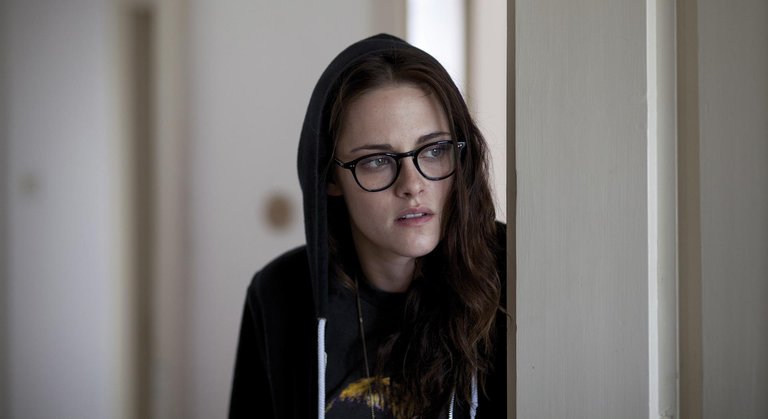
Perhaps the script is not the most brilliant, but it is entertaining and is loaded with many emotions and many psychological challenges, which added to the beautiful places of the Swiss mountain, including that strange and wonderful phenomenon known as Maloja Snake (a snake of clouds that slide in the middle of the mountains) generate both pleasant and uncomfortable physical sensations in the spectators, who cannot remain impassive, neither in the face of the amazing nature, nor in the face of Maria's personal drama.
Quizás el guión no sea el más brillante, pero sí es entretenido y está cargado de muchas emociones y muchos desafíos psicológicos, lo que sumado a los hermosos parajes de la montaña suiza, incluido ese extraño y maravilloso fenómeno conocido como Maloja Snake (una serpiente de nubes que se desliza en medio de las montañas) generan sensaciones físicas tanto agradables como incómodas en los espectadores, quienes no pueden permanecer impasibles, ni ante la asombrosa naturaleza, ni ante el drama personal de Maria.
Juliette Binoche is an extraordinary actress who once again lives up to her task and Chloë Grace Moretz also does quite well, but amidst many nominations, the most important awards she received were Clouds of Sils Maria were for Kristen Stewart who even won the César Award for Best Supporting Actress, becoming one of the five non-French women to win it, the first - and so far, only - North American to do so and the only time an actress takes this award for a role in a 100% English speaking film. That Kristen Stewart is an excellent actress is not a secret, but this performance and recognition helped her get out of the pigeonholing that people had of her in her role as Bella in the Twilight saga and later to participate in films such as Café Society and Spencer, where she was nominated for an Oscar for her portrayal of Princess Diana. On the MUBI platform, where this film is available, it is mentioned that the film is "a Bergman-style story about dualities, reflections and power dynamics" and although it does deal with those themes, in my opinion, Assayas doesn't reaches the level of the legendary Swedish director. However, although it has some details, Clouds of Sils Maria is an interesting film, in form and substance, that raises important existential dilemmas and is worth watching, have any of you seen this film? Which other one do you recommend from the French director? I read you in the comments.
Juliette Binoche es una actriz extraordinaria que una vez más está a la altura de su tarea y Chloë Grace Moretz también lo hace bastante bien, pero en medio de muchas nominaciones, la mayoría de los premios importantes que obtuvo Clouds of Sils Maria fueron para Kristen Stewart quien incluso obtuvo el Premo César a Mejor Actriz Secundaria, convirtiéndose en una de las cinco mujeres no francesas en ganarlo, en la primera - y hasta ahora, única - norteamericana en hacerlo y en la única vez que una actriz se lleva este galardón por un papel en una película de habla 100% en inglés. Que Kristen Stewart es una excelente actriz no es un secreto, pero esta interpretación y reconocimiento le ayudaron a salir de lo encasillada que la gente la tenía en su papel de Bella en la saga Twilight y posteriormente a prticipar en películas como Café Society y Spencer, en donde fue nominada al Oscar por su interpretación de la princesa Diana. En la plataforma de MUBI, en donde está disponible esta película, se menciona que la película es "una historia al estilo de Bergman sobre dualidades, reflejos y dinámicas de poder" y aunque sí trata esos temas, en mi opinión, Assayas no llega al nivel del mítico director sueco. Sin embargo, aunque tenga algunos detalles, Clouds of Sils Maria es una película interesante, en forma y en fondo, que plantea dilemas existenciales importantes y que vale la pena ver, ¿alguno de ustedes ha visto esta película? ¿cuál otra me recomiendan del director francés? Los leo en los comentarios.
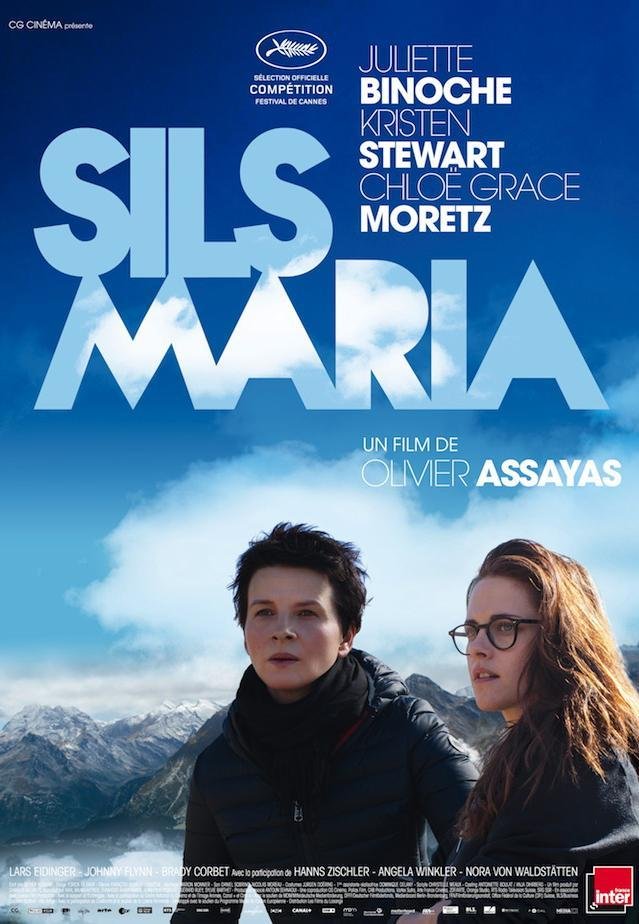
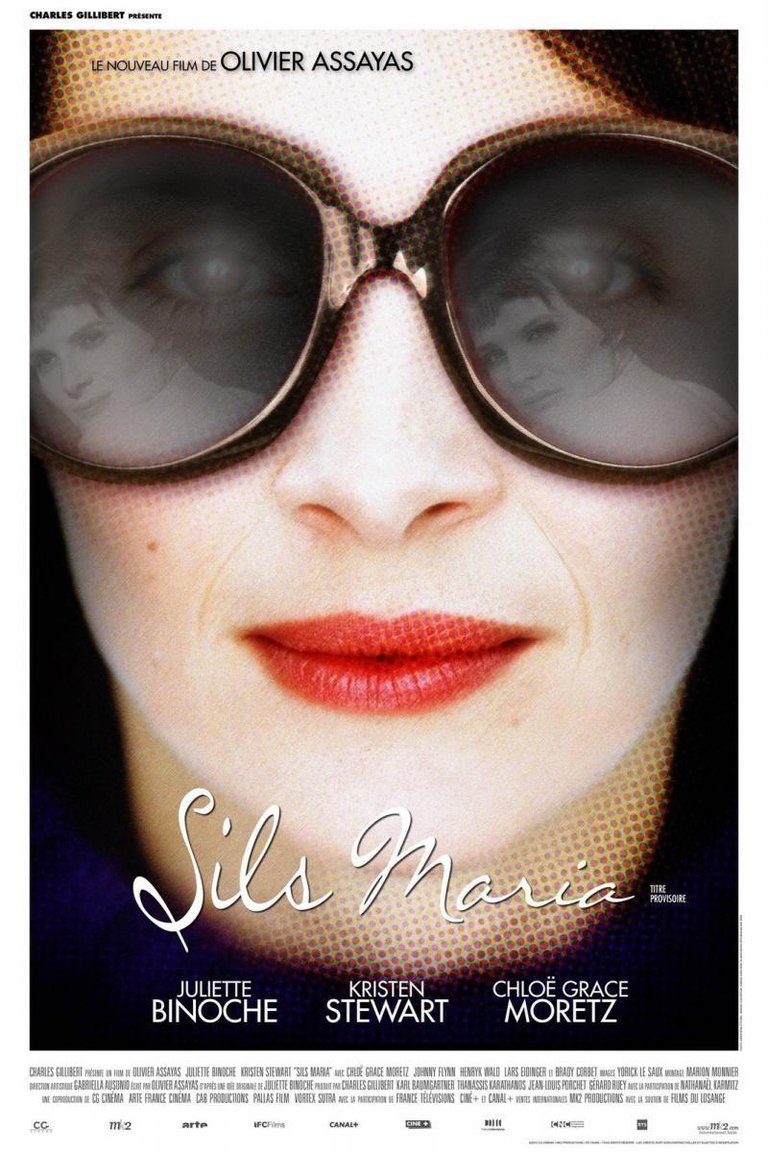

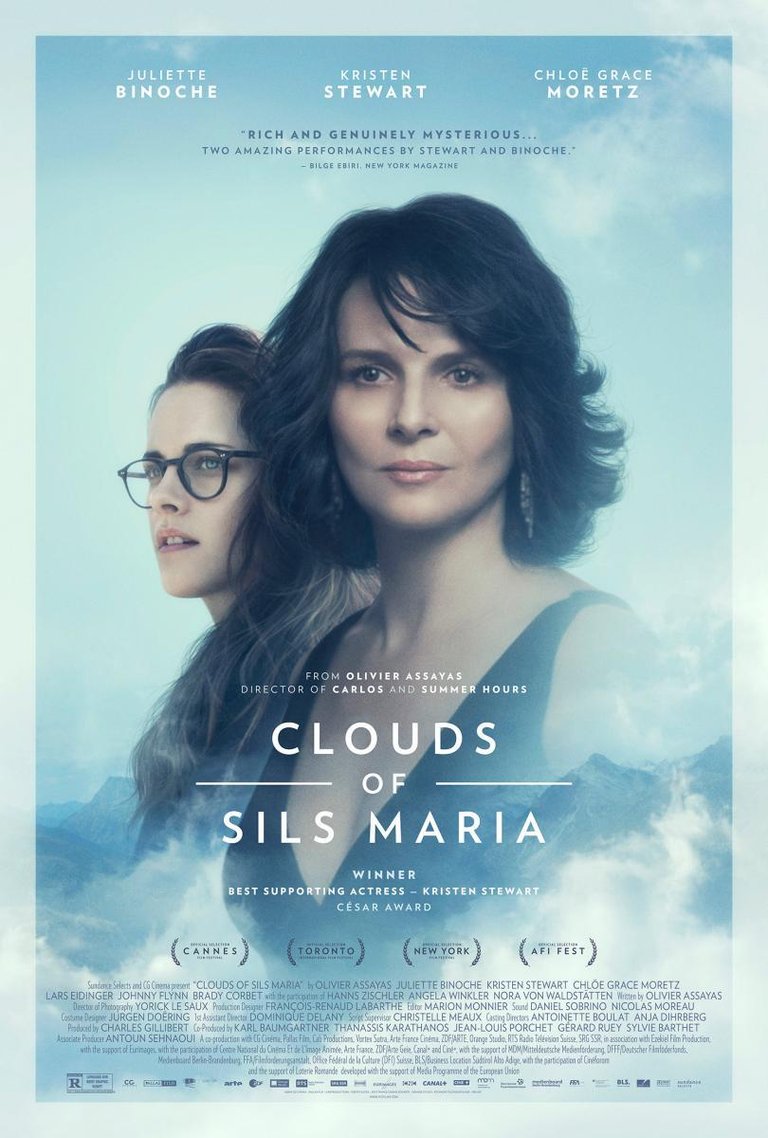


Muy buen análisis del filme, puede que un guion no sea muy brillante pero si tiene buenas actuaciones y además hacen buen uso de los recursos cinematográficos se puede obtener un buen resultado.
Sí, el resultado es interesante. Y el guión es bueno, sólo que sentí que tenía algunos detalles, pero es una buena película. Saludos y gracias por leerme.